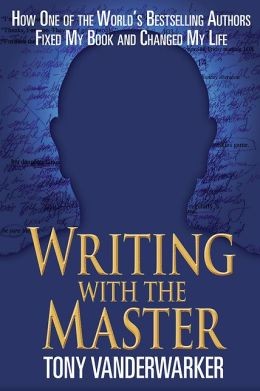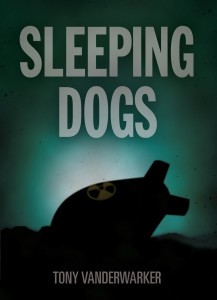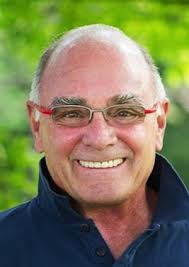“I was sitting at lunch with John one day, and he asked how my writing was going,” Tony Vanderwarker said. “I didn’t want to tell him that I was on my seventh unpublished novel, so I just said it’s been a little bit of an uphill. He said he’d be glad to mentor me, write a thriller with me.”
Sleeping Dogs (AuthorsPress Publishing) is the name of that thriller. Vanderwarker’s the author. And the friend who helped him with it is John Grisham. What’s it like to have John Grisham as mentor?
Find out, because in addition to Sleeping Dogs, Vanderwarker has written Writing with the Master (Skyhorse Publishing), and let the subtitle say it all: “How One of the World’s Bestselling Authors Fixed My Book and Changed My Life.”
[jump]

Writing with the Master could change yours, if you have a thriller in mind or on hand and it’s been a little bit of an uphill. Writing with the Master could save you a ton of wasted effort and give you a fighting chance in the already crowded market for thrillers featuring terrorists on U.S. soil, which is what Sleeping Dogs is about.
What you’ll learn first from Writing with the Master is the first thing you’ll need: time. Time to whip your manuscript into shape and according to some hard and fast rules of the thriller genre. It took Vanderwarker what he’d thought to be a few months’ worth of work more than two — years. And while you’re at it, that thin skin of yours: thicken it.
As Vanderwarker writes in Writing with the Master — this after months spent outlining the plot of Sleeping Dogs and more time seeing to the manuscript that Grisham had editorially carpet-bombed with underlinings, check marks, question marks, and that rarest of marginal remarks,”Good Stuff”:
“When you get to age sixty, you’d think you would have developed a grounded and rock-solid psyche tempered and toughened by life’s rough and tumble. Instead it takes me two days and not a few glasses of wine to get to the point that whenever I pick up John’s notes I no longer feel the psychological equivalent of dry heaves.
“Paralysis and self-pity are my appetizer and main course with sides of bewilderment and humiliation.”
Grisham’s typed-up, lengthy notes to Vanderwarker are a wonder — the wonder being the time and care Grisham took raising such basic but necessary points. Obvious stuff, like getting, at one point in an early version of Sleeping Dogs, the story’s day of the week right. Major stuff, like Grisham’s number-one observation after reading the first 200 pages of Vanderwarker’s first draft:
“This reads like a hurriedly thrown together effort with no time spent reading and re-reading what was written.”
I recommend reading Tony Vanderwarker’s two books this way:
Start with Sleeping Dogs — a good, solid action/thriller featuring a brainy Iranian student (and excellent swimmer) at Rutgers; 11 lost but “live” nuclear bombs left over from the Cold War and dropped accidentally in the U.S.; a onetime star kicker for the University of Virginia football team and retired military weapons specialist named Howard Collyer; a doped-up B-52 Air Force pilot housed in a VA hospital in Pittsburgh; a VA nurse who sets that pilot free by kidnapping him; a group of top-secret Pentagon conspirators up to no good; a former CIA spook; an al-Qaeda sleeper cell; and the fate of the entire Eastern Seaboard.
Then read Writing with the Master. You’ll be familiar with Sleeping Dogs the finished product. You’ll be plenty impressed by what it took for Vanderwarker to see the book to publishable completion. If you have the chance — I did — between Dogs and Master, talk to Vanderwarker. He lives outside Charlottesville, Virginia, where he retired after heading his own 200-person ad agency in Chicago. Except Vanderwarker wasn’t in Chicago when we spoke. He was in Boston. Here’s what Vanderwarker had to say by phone.
Sorry, haven’t got a review copy yet of “Writing with the Master.” Mind filling me in? First, on how you know John Grisham.
Tony Vanderwarker: John and I got to know each other in 2000. We both moved to Albemarle County in Virginia about the same time. I wanted to write novels — I’d been in the advertising business; I sold my business — and he wanted to get away from Mississippi. Our kids ended up going to the same school, our sons were on the same football team. John and I traveled together with the team. We had a strong relationship.
Then, in 2005, John and I started work on Sleeping Dogs, and we worked until 2008. He took me through his whole outlining process.
John’s an outlining maniac! He wrote A Time To Kill by the seat of his pants … took him three years, and he said to himself, “If I’m gonna write another book, I’ve gotta find another way.” So he started this outline “mechanism,” and he wrote The Firm according to his outline and it enabled him to get a plot. As he explained to me, the problem isn’t the beginning and ending of a novel. It’s the middle, which you have to depend on to hold the book up. The outline helps an author be certain that he’s got the material to go for 350 pages.
John was really helpful keeping me on track, not wandering off into subplots, making sure I didn’t spill the beans too early, all kinds of nitty-gritty things that you’ve gotta have under control if you’re going to write a good thriller.

How often did you and Grisham meet to go over the manuscript?
I’d say once every six weeks. There was a long period of time when I crafted the first draft, and he absolutely savaged it. He took me apart, and he’d only read half of it!
What was his biggest complaint?
Details. Plot deviations really caused me huge problems. I had this VA hospital patient, the pilot, who lost one of these nuclear bombs … I had the pilot not being able to remember where the bomb was, but everybody else in the book seemed to know where it was! John said, “You’ve got a big problem here.”
After he got finished with the manuscript, it looked like a flock of chickens with inked feet scampering all over it. I mean, he “got” me on Sigma Nu: It’s not a sorority, as I’d written. It’s a fraternity! Stuff that when you have them in a novel … it just stops the reader in his or her tracks. You know, the reader goes, “WHAT?!”
Knowing John Grisham was going to be critiquing what you wrote, did that freeze you up? Or was it kind of liberating?
It was liberating in a sense but also really demanding, because John wasn’t pulling any punches. He was brutal all the way through. He even admitted it to me after he read Writing with the Master.
So, I’d say the writing and revising were arduous. I was going through his plot-development process for the first time and feeling like the driver of a bus who’s taking direction from the passengers … not knowing where I’m going. John telling me where to go. And frankly, I was in the dark a lot of the time.
What happened: After two years, John said he’d lost his perspective. He’d said everything he could say about the book. Why not try submitting it? So I submitted it … into a market where publishers were sick of terrorist thrillers. I didn’t find any takers.
I set Sleeping Dogs aside and got this idea of writing Writing with the Master, and in writing that book, I internalized and took to heart a lot of the points that John had been making and that I hadn’t followed. I was able to improve Sleeping Dogs dramatically … the way I should have written it the first time if I’d been paying attention to what John was telling me.
You had to write a book about writing a book to finally learn some lessons.
Exactly, by going back through the whole process. John let me use his notes and critiques. They’re all in there in Writing with the Master. So, there I was, reading his notes and putting them down in a book and going, Oh wow, now I get it.
It was a process of rediscovery and very fulfilling, and the most wonderful part of it is that the publisher who picked up Writing with the Master, Skyhorse, also picked up the digital edition of Sleeping Dogs.
The print version of the novel is through AuthorsPress.
That mostly had to do with control and money. I thought I could do better with a small press, because the big presses weren’t going to do me a lot of favors as a first-time author. I figured there isn’t a lot of money on the table. Let me see if I can make this on my own, so I went with AuthorsPress, a two-man outfit in Charlottesville. Welcome to the brave new world of publishing.

But what led John Grisham to take on the role of mentor in the first place?
He’d read that book by Chef Daniel Boulud about mentoring a young chef. He was taken with Boulud’s account, and John said maybe he’d mentor someone. Tony Vanderwarker! I was the lucky guy.
You were a successful advertising guy. Did doing ad work have any influence on your style of writing?
Advertising is a goofy craft of trying to get people to remember product names and attributes and benefits. It has no relationship to anything in the real world far as I can tell. Maybe there’s a similarity between advertising and writing, but advertising is a silly, inane business, and it goes by the wayside rapidly. I don’t know about any parallels with my writing.
Any parallels between you and your main character, Howard Collyer?
Well … we’re sort of the same kind of hot-headed, impulsive, I-know-what’s-right-and-I’m-gonna-make-it-right kind of person.
What if “Sleeping Dogs” or “Writing with the Master” hit it big time? Did John Grisham caution you on the pitfalls of fame?
John guards his privacy zealously. He does a limited amount of interviews, keeps a real low profile. Charlottesville is a place that’s very kind to celebrities … Sissy Spacek, Howie Long. People leave them alone. It’s a good place for John to be.
His latest novel, a sequel to “A Time To Kill,” is in a good place: the best-seller list.
Yeah, John really scored with Sycamore Row.
You didn’t time your two books to be released to coincide with Grisham’s newest?
Timing? It’s pretty easy to come out with a book at the same time as John Grisham, because he comes out with so damn many of them. Just pick a month. But he really did do a beautiful job with Sycamore Row.
And you’ve got two more novels ready for release.
Two comic novels, one about advertising. They’d almost gotten picked up by a publisher years ago. I’d put them on the back burner. And when these two new books of mine came around, I reread those two earlier novels. I knew I had them somewhere, and turns out, they were on floppy discs. I was staring at these, you know, ancient artifacts, but I had a friend with a bunch of old computers, and he was able to take the floppies.
So, I reread those earlier novels — Say Something Funny and Ads for God — and they’re damn good. I’m bringing them out sometime this year. Ads for God is Mad Men but over the top. It was just too early for publishers. Advertising wasn’t something readers or publishers were interested in.
What overall advice would you give struggling first-time authors?
Writing is a combination of endless hard work and not giving up. I gave up on my two comic novels, because I’d had too many rejections and didn’t want to deal with them anymore. When the light suddenly shined on me, I took another look, and they’re wonderful. I’d just given up on them. That was a huge mistake.
You’ve written the books. Now you have to sell the books. How’s the tour?
I’m in Boston now doing interviews. I have signings in Chicago, New York. I’ve got a full schedule.
A book tour is an entirely different kind of endeavor from writing. But here’s where an advertising background comes in. I was on my feet selling to clients for 20 years, so it’s nothing for me to walk into a book store and start talking to people and pushing books into their hands. You know, I’m a shameless salesman.
A lot of writers just can’t do it, and I can understand. They’re good at their own thoughts and working on a computer. But when it comes to standing up in front of a group of people, for them it’s terror time. •
…
And now it’s time now for Tony Vanderwarker’s Kickstarter campaign. It’s described here and here. But you’ll have to wait until next year to read another novel by Vanderwarker, set again in the world he knows well: advertising. Its promising title: Client from Hell. •